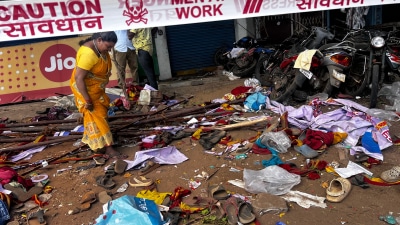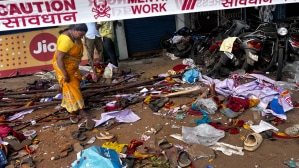Landmark Bill today, leaves out your maid
It will be a new dawn for rag-pickers, scavengers, rickshaw-pullers and an estimated 37 crore labourers in the unorganised sector if the Cab...

It will be a new dawn for rag-pickers, scavengers, rickshaw-pullers and an estimated 37 crore labourers in the unorganised sector if the Cabinet clears a pathfinding Bill tomorrow. However, the Unorganised Sector Workers’ Bill that seeks to extend minimum wages and other social security benefits to labourers in 122 sectors has a glaring omission: domestic helps.
‘‘We are open to the idea and will ensure that they will be included when the Bill is finally drafted before it is notified,’’ assured Baleshwar Rai, additional secretary, Ministry of Labour. Interestingly, an earlier version of the Bill which was being circulated had included domestic workers.
Labour organisations claim there are over 1.5 crore domestic workers in India who are still referred to as ‘servants’. They do not enjoy minimum wages, fixed working hours or any other social security benefits.
Lobbying has already begun for the inclusion of this sector in the Bill. There was a meeting organised by the Indian Social Institute that discussed the lacunae in the Bill. A meeting has also been called by the National Commission of Women that will discuss the domestic workers’ rights vis-a-vis the Bill. Nearly 70 per cent of the domestic workers are women.
A National Campaign Committee for the Informal Sector, headed by former Supreme Court Judge V R Krishna Iyer, is going to study the Bill and point out the deficiencies. The main grouse is that the Bill does not incorporate recommendations given by the technical groups that were set up in November last year as a preparatory exercise. They had clearly recommended the inclusion of domestic workers.
Despite the shortcomings, the Bill is being seen as a bold attempt to bring 75 per cent of the country’s workforce under social security umbrella. The Bill aims to provide benefits like pension, health and welfare schemes at some nominal cost from the workers.
It will, for the first time, make minimum wages enforceable. So far, the Minimum Wages Act 1948 only covered the organised sector. Though minimum wages are set by the Centre every six months, each state is free to set its own wage depending on the prevailing costs of living.
According to the Bill, no worker shall be required to work for more than eight hours a day and each is entitled to a half-an-hour break. Every worker shall be paid wages as prescribed under the Minimum Wages Act 1948 and there shall be no discrimination between men and women in payment of wages.
Other benefits will include maternity benefits for a woman worker and compensation for personal injuries caused to the worker by accident during the course of his duty. The penalty for contravening this is imprisonment for about three months and fine upto Rs 2,000.
Among the 122 sectors listed currently, which the Labour Ministry says is not ‘‘exhaustive’’ as yet, is rag-picking, scavenging, stone-crushing, pottery, toddy-tapping and rickshaw-pulling.
The big question is the implementation. A mechanism has been evolved with the Central Board that will recommend policies and schemes for the workers. There will a state Board that will set up a facilitation centre which will register these workers, guide them on the schemes and facilitate contribution towards the Welfare Fund out of which social security benefits like insurance, pension and provident fund will be given out. Each worker will be provided with a social security number and card.
Some states like Maharashtra did take some steps to implement minimum wages and look into the rights of domestic workers but were never successful because of a labour surplus market.






- 01
- 02
- 03
- 04
- 05

























